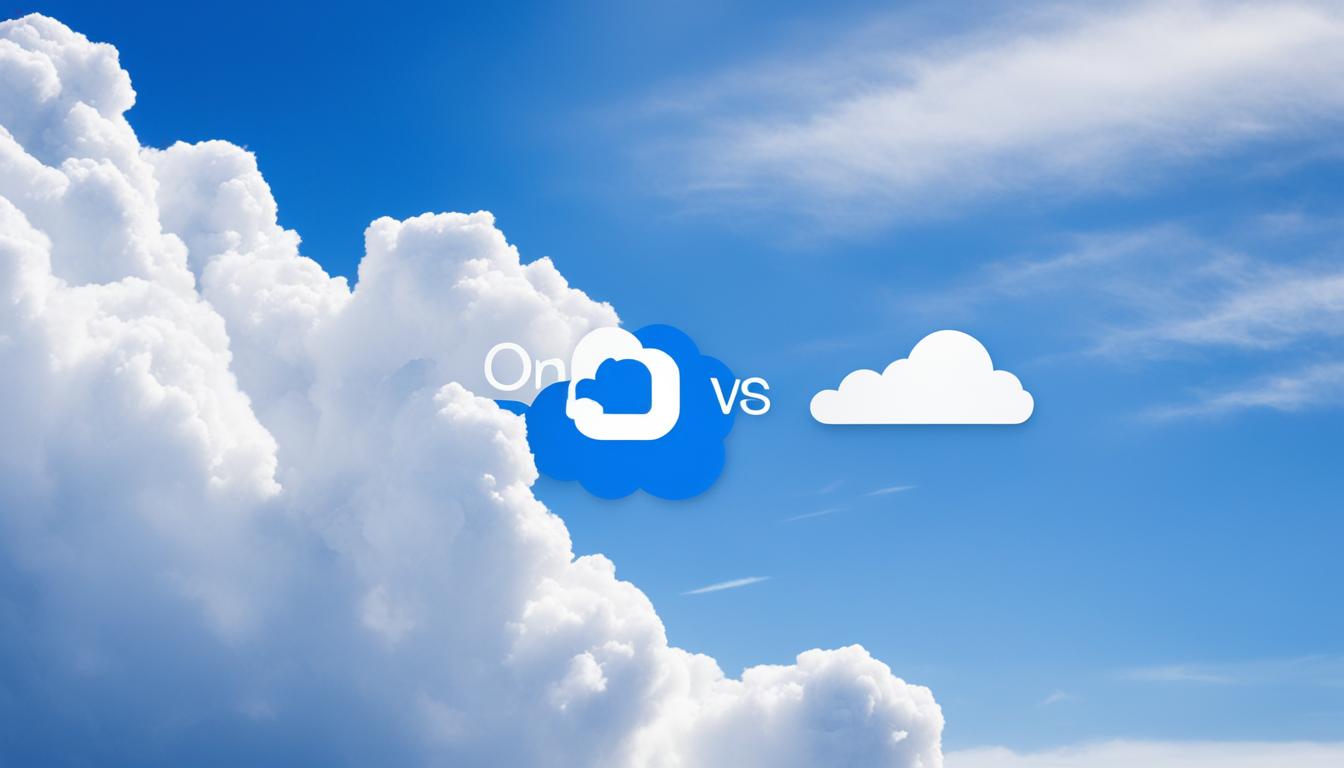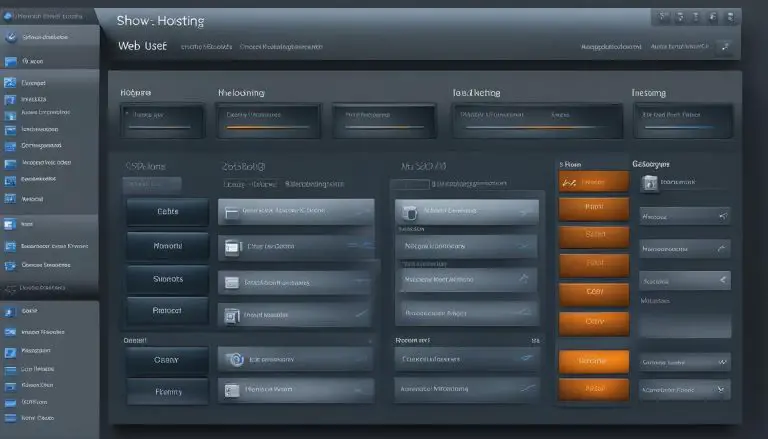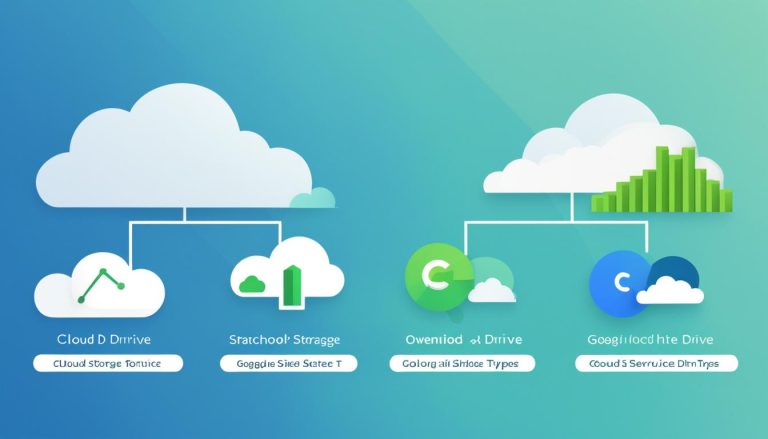OwnCloud vs OneDrive: Personal Cloud Showdown
Cloud storage has become an essential part of our digital lives, providing convenient access to files and data from any device. When it comes to personal cloud storage, two popular options are OwnCloud and OneDrive. In this comparison, I will delve into the features, data privacy, and security of these services to help you determine which one is the better choice for your needs.
OwnCloud and OneDrive are both cloud storage services that offer file synchronization, online file hosting, and secure file sharing. However, they differ in terms of supported platforms, storage limits, special features, user experience, reliability, data privacy, security, pricing, and additional storage options. By considering these factors, you can make an informed decision about which service best meets your requirements.
Key Takeaways:
- OwnCloud and OneDrive are popular personal cloud storage services.
- Both services offer file synchronization, online file hosting, and secure file sharing.
- Consider factors such as supported platforms, storage limits, special features, user experience, reliability, data privacy, security, pricing, and additional storage options when choosing between OwnCloud and OneDrive.
- Evaluate your specific needs and preferences to decide which service is the best personal cloud storage solution for you.
- There are also notable alternatives in the market that provide different features and options.
Supported Platforms and Storage Limits
In the world of personal cloud storage, it’s crucial to consider the supported platforms and storage limits offered by different services. When comparing OwnCloud and OneDrive, it’s important to understand their compatibility and the amount of storage space they provide.
OwnCloud is available on a wide range of platforms, making it accessible to users across various devices. Whether you’re using the Web, Windows, Mac, Linux, Android, iOS, or even Windows Mobile, OwnCloud has got you covered. This versatility ensures that you can access your files and data no matter which platform you prefer.
As for storage limits, OwnCloud offers 2 GB of free storage to start with. If you require additional space, you have the option to purchase an extra 1 TB for as low as $8.25 per month. With OwnCloud, you can easily expand your storage capacity to meet your growing needs.
“OwnCloud supports a wide range of platforms, giving users the flexibility to access their files and data from their preferred devices.” – Your Name, Cloud Storage Expert
On the other hand, OneDrive also offers a broad range of platform support. Whether you’re using the Web, Windows, Mac, Android, or iOS, OneDrive ensures that you can seamlessly access your files and data across all your devices.
When it comes to storage limits, OneDrive provides 15 GB of free storage to get you started. If you need more space, OneDrive offers a variety of upgrade options to suit your needs. You can choose from plans ranging from 100 GB, 1 TB, 10 TB, 20 TB, to a whopping 30 TB, ensuring that you have ample space for all your files and documents.
“OneDrive offers a generous 15 GB of free storage and provides various upgrade options, allowing users to scale their storage capacity as needed.” – Your Name, Cloud Storage Expert
Both OwnCloud and OneDrive cater to a wide range of platforms, ensuring that you can access your files and data conveniently. When considering storage limits, OwnCloud offers 2 GB of free storage with the option to expand it with affordable pricing, while OneDrive provides a generous 15 GB of free storage and offers multiple packages to meet different storage needs.
Now that we have explored the supported platforms and storage limits of OwnCloud and OneDrive, let’s dive deeper into their special features and integration options.
Special Features and Integration
When comparing the special features and integration capabilities of OwnCloud and OneDrive, it’s important to consider the unique offerings of each service that enhance the user experience and streamline productivity.
OwnCloud
OwnCloud stands out with its comprehensive set of special features and integration options:
- 256-bit AES and SSL/TLS Encryption: OwnCloud prioritizes data security by providing strong encryption protocols, ensuring that your files and information are protected.
- File Version History: With OwnCloud, you can easily retrieve previous versions of your files, allowing you to revert back to earlier iterations if needed.
- Password-Protected Sharing Links: Share files securely with password-protected links, giving you control over who can access your shared content.
- Device Data Wipe: In case of a lost or stolen device, OwnCloud lets you remotely wipe the data from that device to prevent unauthorized access.
- Collaboration with Dropbox Paper: OwnCloud integrates seamlessly with Dropbox Paper, enabling you to collaborate with others on documents, notes, and ideas.
- Integration with Microsoft Office 365: With OwnCloud, you can connect your storage to Microsoft Office 365, allowing for efficient collaboration and file management.
OneDrive
OneDrive offers its own unique set of special features and integration capabilities:
- PFS Encryption: OneDrive employs Perfect Forward Secrecy (PFS) encryption, ensuring that your data is protected and secure.
- Real-time Collaboration on Office Files: Collaborate with others in real-time on Word, Excel, PowerPoint, and OneNote files, making teamwork more efficient.
- Sharing Files or Folders: Share files or folders with others, granting them access to view, edit, or collaborate on your content.
- Search for Text in Images and Scanned Documents: OneDrive utilizes optical character recognition (OCR) technology, allowing you to search for words within images and scanned documents for easy retrieval.
- Integration with Microsoft Office Suite: As part of the Microsoft ecosystem, OneDrive seamlessly integrates with the Microsoft Office suite, providing a cohesive and familiar user experience.
Both OwnCloud and OneDrive offer a range of special features and integration options that cater to different user needs. The choice between the two depends on your specific priorities and preferences in cloud storage capabilities.
Image
User Experience and Reliability
When it comes to user experience and reliability, there are a few key players in the cloud storage industry. Dropbox, which has been in the market since 2007, is known for its ease of use and reliable performance. It paved the way for personal cloud storage and has built a strong reputation over the years.
Another popular option is Google Drive, which was launched in 2012. It is highly user-friendly and integrates seamlessly with other Google services, providing a smooth and convenient experience for users.
On the other hand, OwnCloud requires a bit more technical knowledge to set up as it is a self-hosted solution. While it may require some initial configuration, it offers users complete control over their data and storage, which can be appealing to those who prioritize privacy and data ownership.
For Windows users, OneDrive offers a familiar user experience as it is part of Microsoft’s ecosystem. It integrates seamlessly with Windows devices and provides an intuitive interface for storing and accessing files.
“Dropbox and Google Drive have set the standard for user-friendly cloud storage, but OwnCloud offers a unique self-hosted solution for those who prioritize control over their data. Meanwhile, OneDrive caters to Windows users by providing a seamless user experience within the Microsoft ecosystem.”
Overall, user experience and reliability are important factors to consider when choosing a personal cloud storage service. Whether you prioritize simplicity, control, or integration with specific platforms, there is a solution out there that meets your needs.
Data Privacy and Security
When it comes to personal cloud storage, data privacy and security are paramount concerns. In this section, I will discuss the data privacy and security features of both OwnCloud and OneDrive, helping you make an informed decision for your cloud storage needs.
OwnCloud: As the name suggests, OwnCloud allows you to host your own cloud storage, giving you complete control over your data. With OwnCloud, you can ensure maximum privacy and security by keeping your files on servers that you own and manage. This self-hosting option is ideal for individuals who are concerned about data privacy and want to avoid giving access to their files to third-party providers.
OneDrive: Managed by Microsoft, OneDrive offers robust security measures to protect your data. It employs encryption and authentication protocols to safeguard your files from unauthorized access. While OneDrive is backed by the resources and expertise of a large tech company, some users may have concerns about entrusting their data to a third party.
Both OwnCloud and OneDrive take data privacy and security seriously, but they offer different approaches. OwnCloud gives you complete control over your data, while OneDrive provides the convenience and reliability of a managed cloud storage service. Your choice depends on your priorities and preferences.
In the image above, we can see the importance of data privacy and security represented visually. This reinforces the significance of these factors in the world of cloud storage.
Pricing and Additional Storage Options
When comparing personal cloud storage options like OwnCloud and OneDrive, pricing and additional storage options play a crucial role in making the right choice for your needs. Let’s take a closer look at the pricing plans offered by both services:
OwnCloud
OwnCloud follows a straightforward pricing structure. It offers 2 GB of free storage to get started with. If you require additional storage, you can upgrade to 1 TB for a flat rate of $8.25 per month. This flexible pricing option allows you to scale your storage needs without breaking the bank.
OneDrive
OneDrive offers a range of pricing plans to accommodate different storage needs and budgets. The entry-level plan provides 15 GB of free storage, which is generous compared to other cloud storage services. If you need more storage, you can choose from various pricing tiers, starting from $2 per month for 100 GB and going up to $300 per month for 30 TB. OneDrive also offers the option to add more storage to your Office 365 subscriptions, providing additional value for those who use Microsoft’s productivity suite.
Both OwnCloud and OneDrive provide affordable pricing options and the flexibility to scale storage as your needs evolve. Whether you require a smaller storage space or a larger capacity for your personal or business files, these providers offer competitive pricing plans to suit your requirements.
Now that we’ve explored the pricing and additional storage options, let’s dive deeper into the other aspects of these cloud storage services.
“With OwnCloud’s flat rate pricing and OneDrive’s range of flexible options, you can find a plan that fits your storage needs and budget.”
Notable Alternatives
Apart from OwnCloud and OneDrive, there are other notable alternatives available in the market. These cloud storage services offer unique features and cater to specific needs and preferences.
Box
Box is a popular option that provides 10 GB of free storage. However, it has a file size limit of 250 MB, which may be a limitation for some users. Box offers collaboration features and integrates well with various applications.
iCloud Drive
iCloud Drive is favored by Apple users and offers storage plans tailored for iOS and macOS devices. It seamlessly syncs data across Apple devices, providing seamless accessibility to files and data.
SpiderOak
SpiderOak is a cloud storage service that stands out for its focus on privacy and security. It emphasizes zero-knowledge encryption, ensuring that only you can access your data. SpiderOak also offers cross-platform support and collaboration features.
Amazon Drive
Amazon Drive is a cloud storage service that comes as a benefit of Amazon Prime membership. It offers unlimited photo storage and 5 GB of additional storage for other files. It integrates well with other Amazon services and provides Amazon Prime members with easy access to their files.
These notable alternatives provide users with additional choices and cater to specific needs, whether it’s privacy, platform compatibility, or integration with other services. Each service has its strengths and limitations, and it’s important to consider your specific requirements when selecting a cloud storage service.
Free and Cheap Cloud Storage Options
If you are looking for affordable or even free cloud storage options, there are several services worth considering. These options provide users with varying storage capacities and pricing plans to suit their individual needs. Let’s take a closer look at some of the most popular choices:
Microsoft 365 Family Plan
The Microsoft 365 Family plan offers a generous 6 TB of storage, divided across 6 separate accounts. This plan provides ample space for storing personal files, photos, and documents. With Microsoft’s reputation and reliability, it’s an attractive option for those seeking both quality and quantity.
iDrive
iDrive is another reliable cloud storage service that offers competitive pricing. With iDrive, you can choose between 5 TB or 10 TB of personal storage at a reasonable rate. Their plans are flexible, catering to different storage needs and budgetary considerations.
TeleDrive

If you’re after free cloud storage, TeleDrive may pique your interest. This service offers unlimited cloud storage for free, but it has a unique requirement – it relies on Telegram’s APIs. However, if you’re already an active Telegram user, this can be a convenient and cost-effective option for accessing your files from anywhere.
pCloud
pCloud provides 10 GB of free storage to get you started. In addition to their free offering, they also have lifetime cloud storage options available for purchase. This means you can enjoy the benefits of a premium plan without the worry of recurring monthly fees.
Icedrive
Icedrive is a cloud storage service that prioritizes privacy and security. They offer 10 GB of free storage for users to store their files securely. If you require more storage, Icedrive also offers reasonably priced plans tailored to larger storage needs.
Mega
Mega is another option that provides users with a generous amount of free storage. They offer 20 GB of free storage, making it an attractive choice for those who require additional space beyond the initial 10 GB offered by many other providers. Mega also offers affordable paid plans for users who require even larger storage capacities.
WeTransfer
If you’re looking to share files quickly and easily, WeTransfer is a popular choice. While it may not offer long-term storage solutions, it does provide a free data-sharing service with a limited storage duration. It’s a convenient option for transferring files to friends, colleagues, or clients.
When exploring free and cheap cloud storage options, it’s important to consider factors such as storage capacity, reliability, and ease of use. Each service mentioned here offers distinct features and benefits, so take the time to assess which aligns best with your storage requirements and budget. Whether you’re in need of ample storage space or looking for a cost-effective option, these services can help you securely store and access your files whenever you need them.
Conclusion
When evaluating the options of OwnCloud and OneDrive for personal cloud storage, it is crucial to assess your specific needs and preferences. OwnCloud stands out with its self-hosting capability, granting complete control over data privacy and security. On the other hand, OneDrive seamlessly integrates with the extensive Microsoft ecosystem and offers a user-friendly experience.
Both OwnCloud and OneDrive have their unique strengths and limitations, making it important to prioritize the factors that matter most to you. If maintaining full control over your data is a top priority, OwnCloud’s self-hosting feature is an excellent choice. However, if you value ease of use and integration with other Microsoft services, OneDrive is a strong contender.
In conclusion, determining the best personal cloud storage solution between OwnCloud and OneDrive depends entirely on your individual requirements. By considering factors such as data privacy, security needs, platform compatibility, and overall user experience, you can make an informed decision that aligns with your specific needs for personal cloud storage.
FAQ
What platforms does OwnCloud support and what are the storage limits?
OwnCloud is available on Web, Windows, Mac, Linux, Android, iOS, and Windows Mobile. It offers 2 GB of free storage, with the option to purchase additional 1 TB for $8.25 per month. The file size limit is up to 20 GB per file.
What platforms does OneDrive support and what are the storage limits?
OneDrive is available on Web, Windows, Mac, Android, and iOS. It provides 15 GB of free storage, with the option to upgrade to 100 GB, 1 TB, 10 TB, 20 TB, or 30 TB at varying prices. The file size limit for most file types is up to 5 TB per file.
What special features and integration does OwnCloud offer?
OwnCloud offers features like 256-bit AES and SSL/TLS encryption, file version history, password-protected sharing links, device data wipe, collaboration with Dropbox Paper, and integration with Microsoft Office 365.
What special features and integration does OneDrive offer?
OneDrive provides features such as PFS encryption, real-time collaboration on Word, Excel, PowerPoint, and OneNote files, sharing files or folders with others, and search for text in images and scanned documents. It also integrates well with the Microsoft Office suite.
What is the user experience and reliability of OwnCloud?
OwnCloud requires a bit more technical knowledge to set up as it is a self-hosted solution. However, it offers complete control over data privacy and security. It is a reliable choice with a loyal user base.
What is the user experience and reliability of OneDrive?
OneDrive, as part of Microsoft’s ecosystem, offers a familiar user experience, especially for Windows users. It is a popular choice and is known for its reliability and seamless integration with other Microsoft services.
What are the data privacy and security features of OwnCloud?
OwnCloud allows you to host your own cloud storage, giving you complete control over your data. It offers 256-bit AES and SSL/TLS encryption, ensuring maximum privacy and security.
What are the data privacy and security features of OneDrive?
OneDrive, being a cloud storage service managed by Microsoft, offers robust security measures such as encryption and authentication protocols. However, some users may have concerns about entrusting their data to a large tech company.
What are the pricing and additional storage options for OwnCloud?
OwnCloud’s pricing is straightforward, with additional storage available at a flat rate of $8.25 per month for 1 TB.
What are the pricing and additional storage options for OneDrive?
OneDrive offers various pricing tiers depending on the amount of storage needed, ranging from $2 per month for 100 GB to $300 per month for 30 TB. It also provides the option to add more storage to Office 365 subscriptions.
What are some notable alternatives to OwnCloud and OneDrive?
Some notable alternatives to consider are Box, iCloud Drive, SpiderOak, and Amazon Drive. Each alternative has its strengths and caters to different needs and preferences.
What are some free and cheap cloud storage options?
Some free and cheap cloud storage options include Microsoft 365 Family plan, iDrive, TeleDrive, pCloud, Icedrive, Mega, and WeTransfer. These services offer various storage plans to suit different budgets.
Which personal cloud storage service is the best choice?
The right choice between OwnCloud and OneDrive depends on your specific needs and preferences. OwnCloud offers self-hosting, giving you complete control over data privacy and security. OneDrive, on the other hand, offers seamless integration with Microsoft’s ecosystem and a user-friendly experience. Evaluate which factors are most important to you in order to make the best decision for personal cloud storage.
- About the Author
- Latest Posts
Katharina arbeitet und schreibt als Reise-Journalistin und Medien-Bloggerin bei der Web-Redaktion.net. Sie reist leidenschaftlich gerne und bloggt darüber unter anderem auf Reisemagazin.biz.






